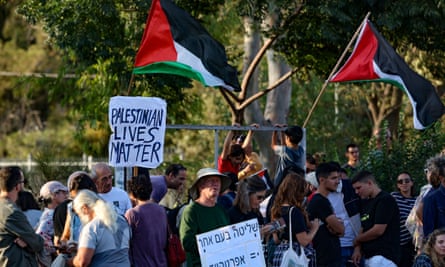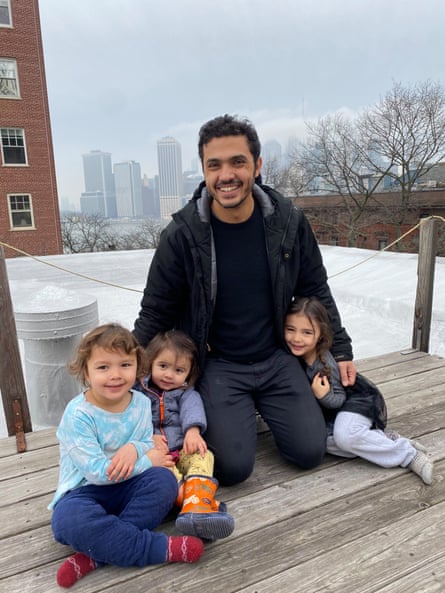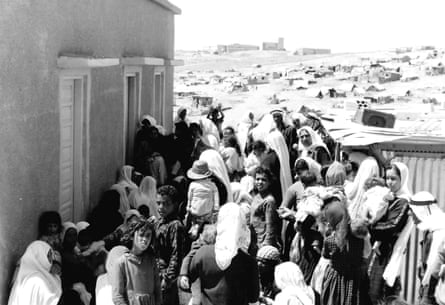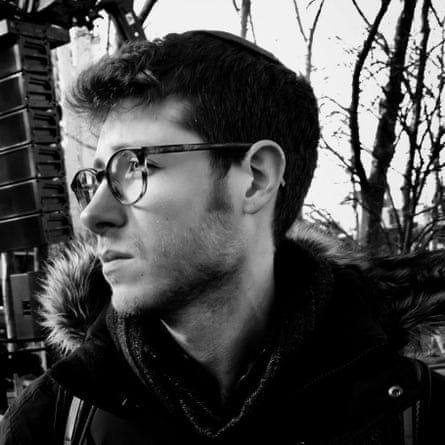For years I’ve watched hopefully as Palestinians, Jews and other people of goodwill have begun building a mass movement in the US for Palestinian freedom. With Hamas’s attacks in southern Israel and Israel’s ensuing bombing of Gaza, I’m fearful now that it’s falling apart.
This moment of agony, rage and terror is driving many Jews and Palestinians away from each other. How should an ethical movement for Palestinian liberation respond to Hamas’s attack on Israelis and Israel’s attack on Gaza? And how can Jews and Palestinians who believe in mutual liberation remain allies amid this horror?
To address the debate currently taking place, I spoke with two activists who consider themselves in the milieu of the Israel-critical American left, with backgrounds in either side of this conflict: Ahmed Moor, a Palestinian American activist born in Gaza who is the co-editor of After Zionism: One State for Israel and Palestine, and Joshua Leifer, a prominent progressive critic of Israel who has also been highly critical of the unwillingness of some on the left to condemn Hamas’s killing of civilians.
A condensed and edited version of our conversation, originally held on my Substack, is below.
Peter Beinart: We all have a particular position from which we experience these events based on our own relationships. Can you both reflect on the set of emotions and experiences you felt when you started to hear the news on October 7?
Joshua Leifer: I am an American Jew, but I’ve also lived in Israel for several years and have family and close friends there. I’m also part of a leftwing, anti-occupation community there that does a lot of solidarity work.
In some ways I’m wary at this point of delving into this because what’s happening in Gaza is so horrifying and I don’t want to detract attention from it. But as this time has gone by, I’ve reflected more on my own positioning. What disturbed me in the immediate aftermath of what happened on October 7 wasn’t primarily the reaction of the Palestinians I know. It was the reactions of some leftwing activists, most of them in America and not Palestinians, who I felt were very quick to celebrate during a time when all of the Israelis I know were dealing with the gravity and horror of what Hamas was doing.

The left that I believe in and feel like I’m a part of is a left that abhors the killing of civilians. But the debate that ensued was not even about the legitimacy of armed resistance, which everyone seemed to take for granted – but simply whether you could condemn the killing of civilians. That discourse had slid in a direction I felt was morally untenable.
Of course there’s also a personal element to it. I’m a person who is deeply related to Israel and Israeli life. My children will probably have Israeli citizenship. And I found myself in my leftwing political community confronting people, comrades, who seemed to be saying to me, “If what happened in Kibbutz Nahal Oz happened to your children, we would be OK with it.”
Up until this war, Israel’s narrative had never seemed more illegitimate and more troubled. The judicial overhaul that Netanyahu was pushing forward was driving a wedge within the institutional Jewish world. People who had been ardent Zionists policing the Jewish discourse were suddenly willing to speak in ways that they hadn’t before. For the first time, it felt like there was a real opening: the very beginnings of a new kind of political relationship that American Jewish communities might have with Israel.
I felt like having a left that seemed indifferent to the killing of civilians and to Jewish suffering was going to mean that all the work that I spend a lot of my life doing – trying to take American Jews from kneejerk Zionism to a place where they can understand the need for Palestinian freedom – was now going to be much more difficult.
I fear that has come true. American Jewish institutional life hasn’t been this lockstep on Israel in more than 15 years. That’s a huge loss in the long run.
Ahmed Moor: I experienced a commingled set of feelings. You can’t, as a Palestinian, as somebody of conscience, observe that bulldozer breaking through that wall and not feel a sense that “the natives have broken free – good for them”. At the same time, I had a deep sense of foreboding. That was even before anybody had any idea what was actually happening, because Israel extracts a heavy price for any perceived transgression. If all Hamas had done was break through that barrier, there would have been a disproportionate response. And so I realized this was going to be bad, even before the other images came out.

I’m a father of three small kids. You can’t see the images of children, irrespective of whose children they are, and not feel deeply hurt by what happened. And that’s concatenated with what you know is coming: inevitably, lots of dead Palestinian kids, too.
I understand that people were exulting in ways that are shameful. I hope they’ve had a chance to reflect and I hope that upon reflecting, many of those impulses aren’t really how they feel. I don’t think anybody’s really served by the kind of id-oriented response we saw on social media.
But honestly, everything we’re talking about is a sideshow to the main event, until the horrors actually stop and we all have a chance to breathe and grieve.
Beinart: I really appreciate that, Ahmed. There’s an instinct to demand all sides stand up against forces in their community that devalue human life but this assumes a power balance that doesn’t exist at all, not only in Israel-Palestine, but also in the United States. There’s just a massive power discrepancy. I think that we all agree that any targeted killing of innocent civilians is wrong. But I also have the sense as a non-Palestinian that Palestinians really resent being policed in terms of their speech and told what when they have to say and when in order to be able to enter into conversations.
Moor: There is so much value in trying to think in clear, rights-oriented frameworks. Irrespective of whether we’re experiencing oppression directly or not, we have a responsibility to speak up as people who are fundamentally empowered by living in the United States, whether you’re Jewish, Palestinian, whatever. I have this heightened responsibility to speak up, because I have privilege, I have access. That may not be the same dynamic that Jews in the United States feel relative to Jewish people in Israel. But I think our individual responsibility to speak up is a function of our being human.
Noura Erakat wrote a great reflection on the idea of a perfect victim or a perfect native. I’m not going to support somebody because they present beautifully or cry in just the right way. I’m going to support them because it’s the right thing to do.
Beinart: Josh, I wanted to go back to the point you were making about the left and one of the questions that I’ve been struggling with. Let’s accept that there were people on the left who have a very disturbing notion of decolonization that doesn’t involve seeing Israeli Jewish life as precious, or maybe sees what happened as kind of a necessary process – in that eggs might have to be broken in order to create an omelette. How much does it matter? I recall the period after 9/11, when a bunch of people on the left said some stupid things about al-Qaida or the Taliban. But did those things really matter, given that those people didn’t have any power? How important is it to try to heal and to overcome some of those differences?
Leifer: I don’t think healing the left is the first-order task at the moment. The first-order task is to stop the war and bring back the hostages.
I hope it has been clear that even though what I have written was a critique of the left, in no way is my solidarity and support for Palestinian human rights contingent on Palestinians saying the right words or their allies saying the right words. My belief in the need to end the occupation and the siege and for everyone between the Jordan River and the Mediterranean Sea to be free and equal – that doesn’t change, even if I happen to think that some American activists trying to show solidarity with Palestinians have made mistakes in how they advocate for these things.
But I also fear that there may be a substantive political disagreement lurking under the surface. If what the people whom I’ve criticized actually want is for Israeli Jews to leave – basically the Algeria solution – I don’t think this is viable or just. There are generations of Israeli Jews who have been born there. They also deserve the right to live there. If it’s just rhetoric, then I think it’s bridgeable. And I hope to do the work of bridging it.
I’ve seen the slogan “this is what decolonization looks like” a lot. But there are many things decolonization could look like. Decolonization could look like something more resembling the South Africa model, Peter, as you wrote in your piece, where a system of apartheid and oppression and ethno-racial hierarchy falls, but the people themselves continue to live. I would support that form of decolonization. But if decolonization looks like the burning of children and the execution of families in their homes, in the hopes of removing the people who live there, then that’s a political red line. And I think it’s probably a political red line for 99% of Israelis and American Jews.
Beinart: The end of apartheid didn’t really bring decolonization in South Africa. If you go to South Africa, you see it immediately – although it’s obviously vastly better than apartheid, the conditions haven’t been meaningfully addressed. And that’s why there may have to be another kind of revolutionary moment there. I feel that failure weighs heavily on all of this.
But Ahmed, I’d love to know where you think the discourse is in Palestinian circles about this question of what decolonization looks like. With Hamas, one doesn’t have a great sense of exactly what their vision is beyond an Islamist state, and the Palestinian Authority is wedded to a zombie two-state solution. So what is your sense of this discourse that Josh is referring to?
Moor: I think many people truthfully desire the total elimination of the source of their pain. For somebody who’s never interacted with an Israeli – and this is the majority of people in the Gaza today, whose only interactions with Israelis have been with a shadowy figure beyond the razor wire, the source of unending pain – they probably don’t think that deeply about what “this is what decolonization looks like” actually means.

I don’t believe in a Jewish state. I believe in a state that is composed of equals, whether they be secular or Jewish or Hindu, who cares. I believe in liberal democracy, which is a point of view at odds with the Muslim Brotherhood and segments of people in Hamas. I think that one of the things that gets lost here is that we’re pluralistic, like anybody else. We have divergent points of view. We have points of view which are informed heavily by our material reality, like anybody else. What I would regard as the locus of Palestinian resistance today is around the one-state solution. It’s around a perspective that says that 75 years have passed since Israel’s original sin, the Nakba [or “catastrophe”, when 700,000 Palestinians were expelled or fled from their homes during the 1948 war]. I don’t like that that’s never been reckoned with. I don’t like that there have never been reparations. And yet, I have to live with these people.
So what’s the framework? One state with equal rights. Some of us have talked about federalism, a confederation. That’s an effort to grapple with the concurrent humanity everywhere. Josh is right – when somebody is born somewhere, they’re of that place. They belong there.
I think a lot of armchair activists – and I don’t want to speak derisively – read books about Algeria and Franz Fanon, but they don’t really have a view of what horrific violence means, or what it means to invite a set of conditions in which a lot of young people, babies, are dead. You kind of want to ask them – what do you mean precisely? The end of Zionism? Absolutely. I’m on board. Violence, community violence, ethnic violence? No, that’s not what I’m about.
Beinart: Ahmed, you’ve been in this work long enough to see the opinions of people change. I’m one of those people whose opinions have changed. As someone who’s been working in these communities over the years, what have you observed about what it takes to make people change their views?
Moor: I think there’s a real practical dimension to it, which is exposure and orientation to values. In the psychological literature, if you’re feeling down one day and you put a grin on your face, you’re going to eventually begin to feel happy. In this case, you’ve got your emotions – but you begin to grapple with ideas of human rights. Why do UN resolution 194 [which addresses the rights of Palestinian refugees to return to their homes] and resolution 242 [which called for Israel to withdraw from territories occupied in 1967 in exchange for peace] really matter? What does it mean to actually observe the rights of others? What are human rights practically? What is the common language that we can all use?
When you begin to reach for that material often enough, and apply those arguments often enough, if you’re paying attention, you can’t but begin to believe in them. Those values become your values.
My community is a human rights community – the people who stand on principled ground. I love my people. I love the Palestinians, I love the people here in West Philadelphia, where I live now. But that is not to say that these are the people with whom I’m going to stand 100% of the time. We’re having this conversation about Palestinians and Israelis, because it’s relevant to our geopolitical context. But the arguments ought to be salient irrespective of which ethnic conflict we’re talking about.
Beinart: Josh, I wanted to ask you a question you probably get asked from the right, or just from the rest of the Jewish community, which is essentially: “What would you do if you were leading Israel in the wake of October 7?” I know the question is a trap, because if you were the leader of Israel you wouldn’t have done all the things that got us to this point. But this entire situation is now so disastrous that it’s difficult to come up with a set of steps that would bring us out of these events. You can call for a ceasefire and release of hostages, but what then? Lift the blockade? Palestinian elections? Start negotiating with Hamas? I can hear the voices of people in the Jewish community laughing at me if I said those things.
Leifer: Were I a pragmatic Israeli leader, I would revive the two-state process. You have an Israeli public that is more angry at the settler right than they’ve ever been, because the reason why there weren’t Israeli soldiers in the western Negev near the Gaza Strip was because they were protecting settlers who were doing violence over the Simchat Torah holiday. Those ministers from the religious Zionist parties are the ones who are being shouted out from funerals and hospital visits. I don’t think their political futures will ever recover.

I still think that the one state that we’re discussing, whether it’s a confederation or a unitary one, is still probably the most just one. But, and it depresses me greatly to say this, my experience with Israelis makes me think that they would resist being made equals within a majority Palestinian state by full force of arms. There is no desire for that kind of living together.
There’s a third example of geopolitical conflict that isn’t being discussed enough in this context. We talk about Algeria, we talk about South Africa – we don’t talk about Yugoslavia. The attempt to force a multi-ethnic coexistence in a place where there’s very little popular desire for it. Those of us sitting out here in the diaspora all want this one-state resolution that, in theory, would be great and would be moral. But given the reality of where Israeli public opinion is, and Israeli politics is, I don’t think it’s realistic at this point.
Were I the head of state, I think a unilateral withdrawal from the West Bank and the creation of a Palestinian state on 1967 borders would be the closest thing to avoiding Yugoslavia. I say this out of concern for Palestinian life, because the imbalance of power is tremendous. Israel is a nuclear-armed country with the full backing of the United States, Britain. If a full-out anti-colonial war happens, I fear it won’t end in the Palestinians’ favor.
Beinart: Ahmed, I hear from a lot of Palestinians this sense, even before October 7 but especially now, that the trauma of the Nakba has been reignited, a terror of another mass expulsion. Do you think that those people who have been forced out of their homes in northern Gaza will ever be able to return? Where are we in that terrifying process?
Moor: I’m hoping they’re able to return. Ethnic cleansing is likely a strategic objective for the Israelis in Gaza. The Israelis are aware of everything Josh just said. The Palestinians aren’t going to settle for apartheid for ever. Do you try to extract 600,000 settlers and risk a Jewish Israeli civil war? Or do you cede political rights and human rights to the Palestinians and live in confederation? I think that’s the big question. The idea of a two-state solution is a non-starter. It’s just geographically impossible. People are so mixed, there’s no separation.
So, the other strategic choice [for the Israeli government] is another round of ethnic cleansing and expulsion. I think the people who are in charge of Israel can say, well, we can reduce this inconvenient native population by a third or whatever, by enacting inhumane, extremely painful, barbaric siege-like conditions. The Egyptians are going to be pressured to open the border, because they’re complicit. And then we can just declare a closed military zone in Gaza.
The whole apartheid question, the whole demographic Palestinian question – that’s alleviated when you expel a bunch of natives. If your view is that Jewish numerical supremacy matters, there’s no other way to think about this conflict without thinking about expulsion as a strategic goal.
Beinart: Because it now represents Palestinian resistance, how do you see the role of Hamas in the vision that you want to get to? How big an obstacle is it? Is there a possibility that Hamas itself could evolve in ways that might not make it an obstacle to the vision of the equal coexistence that you want?
Moor: Hamas is the Stern Gang, it’s the Haganah [two pre-1948 Jewish Zionist militant groups]. The fetishization of Hamas as this embodiment of evil, this thing that can be eradicated, is an example of magical thinking. It’s like saying that rightwing Zionism and the currents that exist across Europe or the extreme right wing here in the United States – to say that those ideas can be eliminated is magical thinking.
If we treat this ethnic conflict like any other ethnic conflict around the world, it’s critical that we bring the belligerents to the table. The eradication of Sinn Fein could not have brought a resolution to the crisis in Northern Ireland. In South Africa, the ANC had to be negotiated with. If you kill 100,000 Palestinians or half a million Palestinians, you won’t eradicate Hamas and the ideas that underpin Hamas’s political movement. Hamas is speaking out for Palestinian rights in a way that [the Palestinian president] Mahmoud Abbas hasn’t in a long time. And so, despite what Joe Biden and Antony Blinken say, at some point, the same way that you’ve got to deal with Likud and Shas [rightwing Israeli parties] and the Haganah back in the day – you have to talk to Hamas. If not this version of Hamas, then the next iteration or the one after that.
Ahmed Moor is a Palestinian American activist born in Gaza who is the co-editor of After Zionism: One State for Israel and Palestine. Joshua Leifer is a prominent progressive critic of Israel.
